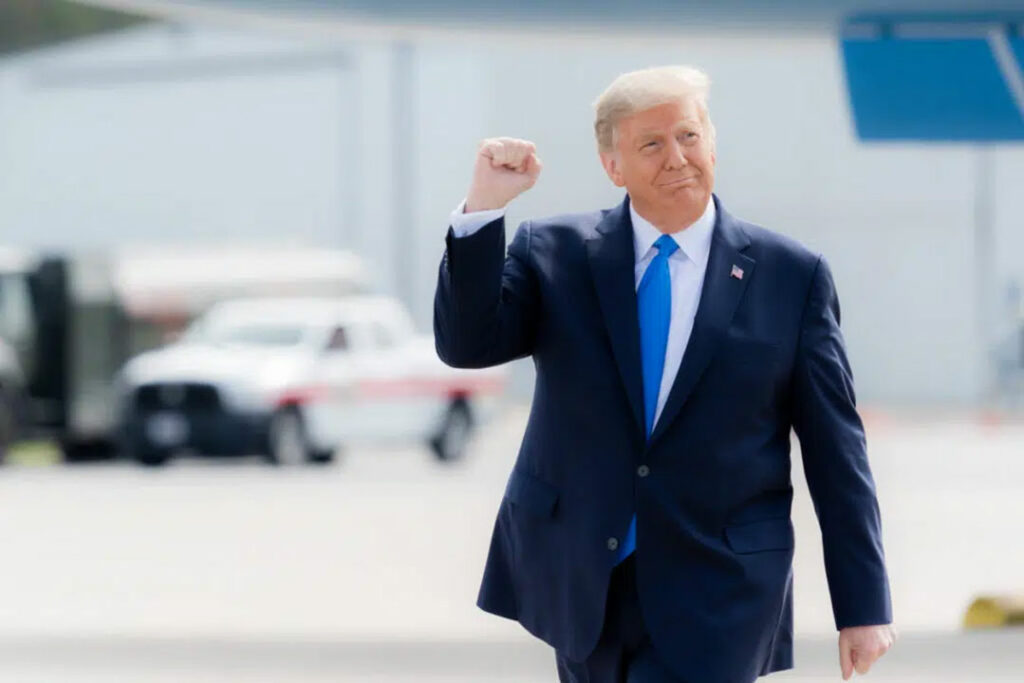The U.S. presidential election has unfolded. The world now waits as Donald Trump formally returns to the White House. This has markets jittery across the globe.

In the Philippines, the fintech sector and other economic players are keenly analyzing what a Trump victory might mean for the local economy.
Trump’s “America First” stance in his previous term brought protectionist trade policies, tax reforms, and immigration restrictions that had global repercussions, and a second term could bring similar economic shifts.
Here’s a closer look at how a Trump presidency could reshape the Philippine economy and what it might mean for the rapidly growing fintech industry.
Trade relations and the Potential for New Tariffs
The U.S. has long been one of the Philippines’ largest trading partners, importing substantial amounts of electronics, garments, and agricultural products.
However, Trump’s previous administration was marked by heightened protectionism, often characterized by the imposition of tariffs on foreign goods to prioritize U.S.-made products.
A return to such policies could have ripple effects in the Philippines, especially if Trump reinstates or introduces tariffs on Filipino exports.
“There’s a worry that if Trump comes back to power, he might impose new taxes on Philippine products or make it harder to trade with the US,” said economist Fernando Ocampo. “Even a small change could hurt local businesses and the economy as a whole and this might lead the Philippines to look for other countries to trade with, like China.”
For fintech companies serving exporters, any disruption in trade could trickle down, leading to lower transaction volumes and affecting revenue streams.
A prolonged downturn in exports would also reduce demand for financial services related to cross-border payments and trade finance, prompting Philippine fintech firms to diversify or innovate in new areas to counterbalance potential losses.
Shifts in Foreign Direct Investment
A cornerstone of the Philippine economy, foreign investment, has historically been bolstered by U.S. firms interested in sectors like technology and business process outsourcing (BPO).
While private U.S. companies might continue to invest in the Philippines regardless of political shifts, any restrictive policies toward overseas investments or aid could dampen growth.
Trump’s previous emphasis on domestic investments and American jobs could lead to a reduction in U.S. support for infrastructure and economic development programs abroad.
The fintech industry could face a dual impact here: reduced opportunities for funding and partnerships with U.S.-based tech firms and a slowdown in infrastructure growth, which would indirectly affect fintech platforms requiring better internet and mobile coverage.
While Philippine fintech companies might struggle without these resources, some experts believe that the reduction in reliance on American investments could drive the Philippines to foster relationships within Southeast Asia, potentially looking to countries like China for alternative investment channels.
This shift could bring increased competition but also open doors to new collaborations with Chinese fintech players, potentially accelerating local innovation.
Immigration and the Impact on Remittances
The Philippines is one of the world’s largest recipients of remittances, with Filipino workers in the U.S. alone sending over US$12 billion annually. According to the latest data released by the Bangko Sentral ng Pilipinas (BSP), personal remittances from overseas Filipinos have increased by 3.7% to US$2.88 billion in May this year — a truly positive turn for the Philippine economy.
Trump’s previous administration saw tightened immigration policies, and similar restrictions could reduce the number of Filipino workers in the U.S., diminishing remittance inflows.
As Regina Lopez, a labor economist, explained, “Remittances are a lifeline for our economy. Any move to limit immigration could directly impact household spending.”
For the fintech sector, reduced remittances could lead to lower transaction volumes on digital remittance platforms, which have become a staple for Filipino families relying on overseas income.
Companies in the fintech space that facilitate cross-border payments might need to find alternative sources of revenue or expand their services within the domestic market.
This scenario could spur innovation as fintech firms explore new products, possibly in personal finance, credit services, and small business lending to tap into local markets.
Impact on the Philippine Stock Market and Currency
Earlier this week, news of Trump’s victory has already sent shockwaves through the Philippine Stock Exchange index (PSEi), which dropped by 1.27% due to cautious investor sentiment. Trump’s protectionist policies have led to fluctuations in global markets in the past, and similar apprehension is being seen now.
Investors are now wary of the implications of a Trump administration, especially given the increased volatility in emerging markets like the Philippines. This market uncertainty extends to the Philippine peso, which weakened against the dollar as Trump’s lead solidified.
So, what does this mean for us? A weaker peso could increase the cost of imported goods, putting additional pressure on local industries dependent on foreign supplies.
Fintech firms involved in forex services and international transactions may need to adapt their pricing strategies to accommodate these fluctuations. At the same time, increased demand for forex hedging services might present new opportunities for fintech companies in this niche.
Realignment in Geopolitical Alliances
In Southeast Asia, the Philippines holds strategic importance due to its geographic location and close ties with the U.S. Trump’s tough stance on China previously impacted relations between the U.S. and China, and a similar approach might bring both opportunities and challenges for the Philippines.
On one hand, if Trump intensifies his policies toward China, American companies might pivot to countries like the Philippines for alternative manufacturing and supply chain needs. This shift could boost demand for Philippine exports, benefiting local industries and the fintech firms that serve them.
However, this situation is complex.
As Rosario Santos, another economist, points out, “If Trump tightens restrictions on China, the Philippines could benefit as American firms seek new manufacturing partners.” Yet, it also risks placing the Philippines in a delicate balancing act between the two superpowers, potentially affecting diplomatic relations with China, a key trading partner.
For fintech firms, this could mean either a surge in demand for digital financial services supporting trade with the U.S. or a challenge if relations with China are strained, affecting broader regional trade.
Preparing for a Resilient Future
While the Philippine economy faces potential risks from a Trump win, there are also avenues for resilience and growth, particularly for the fintech sector.
If protectionist policies disrupt traditional revenue streams, fintech firms could pivot toward serving local SMEs or providing financial literacy solutions that empower individuals and businesses to navigate economic challenges.
The demand for digital banking, personal finance, and local investment platforms could rise as Filipinos look for secure ways to manage their finances in a volatile market.
One potential growth area for Philippine fintech could be focusing on expanding financial inclusion domestically. Many Filipinos remain unbanked or underbanked, and fintech companies could innovate to provide affordable, accessible solutions for this demographic.
These platforms would mitigate some of the adverse effects of reduced remittances by empowering locals to build savings, access credit, and make secure investments within the Philippine economy.
Moreover, the heightened caution among investors due to global uncertainties could boost demand for secure investment platforms. Digital wealth management and robo-advisory services could gain traction as Filipinos seek low-risk investment avenues in response to volatile markets.
This trend could transform how fintech companies approach wealth management, providing opportunities for growth in domestic markets even amid a challenging international environment.
Conclusion
A Trump win poses both risks and opportunities for the Philippines, and by extension, its fintech sector.
While protectionist policies, immigration restrictions, and market volatility may introduce challenges, there is a silver lining for those prepared to adapt.
Fintech firms that can pivot quickly, innovate locally, and strengthen ties within Southeast Asia are likely to weather the storm.
SOURCES:
- “The 2024 US Presidential Election: Impact on Southeast Asia Markets.” https://www.aseanbriefing.com/news/the-us-election-2024-impact-on-southeast-asia-markets/
- “US firms seen to continue investing in PH regardless of election results.”https://news.abs-cbn.com/business/2024/11/4/us-firms-seen-to-continue-investing-in-ph-regardless-of-election-results-322
- “How a Donald Trump win could reshape the Philippine economy?” https://www.brigadanews.ph/how-a-donald-trump-win-could-reshape-the-philippine-economy/
- “Imminent Trump 2.0 paints PSEI red.” https://business.inquirer.net/488700/imminent-trump-2-0-paints-psei-red
- “Trump version 2.0 likely bad for Philippine labor.” https://www.bworldonline.com/the-nation/2024/11/03/632370/trump-version-2-0-likely-bad-for-philippine-labor/







